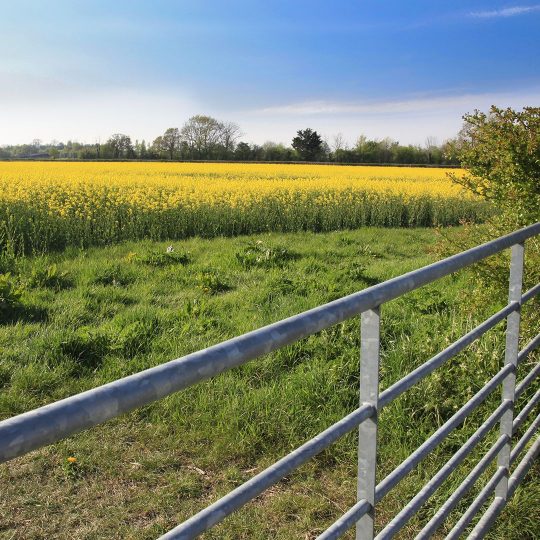Farm Gate Basics
What You Need to Know

Looking for an entrance to your farm, an effective way to wrangle animals, or a form of protection from predators? Here are some farm gate basics you should consider.
Farm Gate Basics: Design
Whether you’re building a farm gate for curb appeal or protection, the purpose of the gate will help determine the proper design. When an appealing look is more important than a strong and sturdy function, your gate materials could be anything from stained wood or ornate rod iron. Although, when you’re trying to keep animals in or out, the design has to factor in the size and strength of the animals, and whether they can fly or jump over or through the gate and fence around it.
The type of terrain will also effect the gate design. Is your gate set in the middle of a flat field, hilly valley, or flood plain? You’ll want to be able to easily open and close your gate, no matter the weather, so keep the ground in mind while planning design.
No matter what material you choose for your gate, it will require maintenance at some point. Wood gates can rot, metal gates can rust, and all gate hardware should be inspected for proper function. Think about how much maintenance you’re willing to do to keep the gate at its best. Also consider if you will be the one to maintain it, or if a professional would be better suited for the job.
Basic Reasons for a Farm Gate
There are many reasons why people may choose to design and install their own gate. Here are a few basic examples you may find around a farm:
- Privacy – Control the flow of people on and off your property, and help deter those from entering with bad intentions. If you own a farm with a lot of land and a long driveway, having a gate at the end of it can also keep people from turning down your road by mistake.
- Protection – Protect your farm house, barns, and equipment with one or many gates, each designed to properly protect what it leads to.
- Predators – Help keep your animals safe by installing a gate and fence system designed to keep predators out. Depending on where you live, bears, wolves, coyotes, and other animals could be prowling your property. Even a neighborhood dog could mean disaster for your chickens and other smaller livestock.
- Livestock – Keep free range farm animals where they belong with a gated area. Animals that freely roam around pastures won’t wander too far. You can also section off training grounds, corrals, and any other open area with a secure gate and fence.
- Appeal – Those driving by your farm can appreciate the look of a well-designed gate. Complete the look with signs if your farm offers a market, training, or boarding. Let your gate set the tone for what customers may find beyond its appealing aesthetic.
If you’re thinking of designing a farm gate, contact Security Five at 610-323-9511 with any questions you may have about the right type of gate and installation tips to best fit your needs.